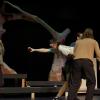February 5, 2003 - 4:00pm
Bacteria are the predominant form of life on Earth. They live in almost any environment, they compose most of the Earth’s biomass, and their genetic and metabolic diversity far exceeds that of so-called higher organisms.
<?xml:namespace prefix = o ns = "urn:schemas-microsoft-com:office:office" />
If you would like to learn more about bacteria and how they are able to transfer genes from one to another, Andrew Cameron, Ph.D. candidate in the department of Microbiology and Immunology at UBC, will be giving a free public lecture Wednesday, February 12 at 7 pm at Malaspina University-College.
The lecture, to be called Gene Transfer in Bacteria: How and why does it occur and how does it affect bacterial evolution will be held in building 355, room 203.
According to Cameron, the study of bacteria has been greatly enhanced by new techniques for genetic analysis.
“In 1995, the bacterium Haemophilus influenzae became the first organism to have its genome completely sequenced,” said Cameron. “Since then, the sequencing of many more bacterial genomes has offered great insight into how genomes evolve. For instance, many examples of gene transfer events between distantly related organisms are now apparent.”
This lecture will focus on the mechanisms that allow for gene transfer in bacteria and will address such questions as: Why do bacteria transfer DNA, and consequently genes, to one another? How often does gene transfer occur? How does gene transfer affect bacterial evolution?
Andrew Cameron is a recent graduate of the Bachelor of Science (Biology) degree program at Malaspina University-College. He is currently working on his Ph.D. degree in the department of Microbiology and Immunology at the University of British Columbia.
Refreshments will be served following the lecture.
The Malaspina University-College Science & Technology Lecture Series is sponsored by the Mid-Island Science, Technology and Innovations Council (MISTIC), Malaspina Faculty of Science and Technology, and the MFA Professional Development Committee.
Tags: In the Community






